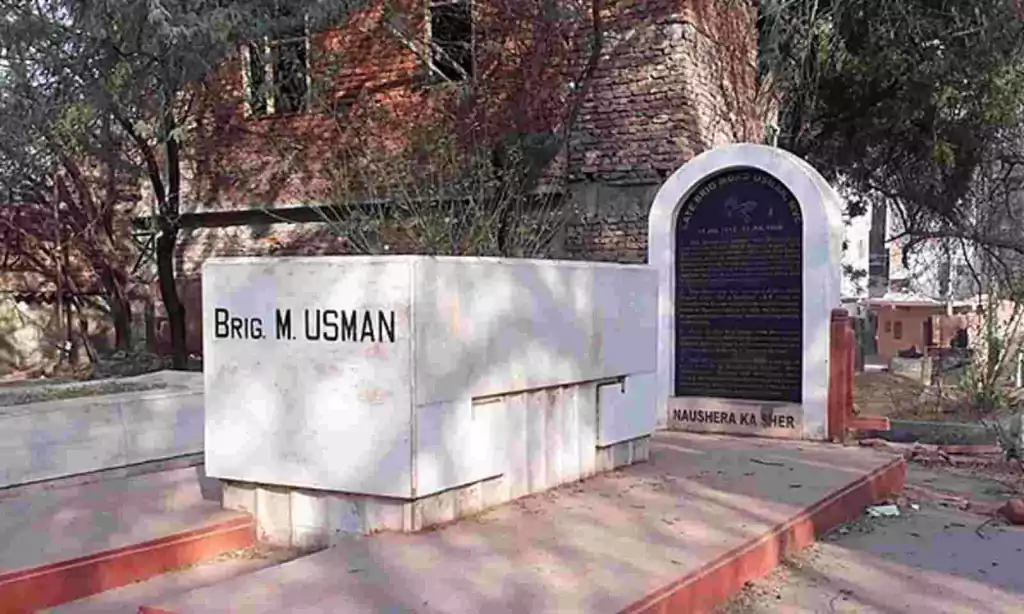Recently, the birth centenary of Brigadier Muhammad Usman was celebrated in India. Indian Vice President Hamid Ansari and Chief of Army Staff General Bikram Singh attended the ceremony. Usman was born in Azmagarh and commissioned in Indian army in 1934 and was among the last batch of Indians to be trained at Royal Military Academy at Sandhurst. He joined 5/10 Baluch Regiment (now 12 Baloch of Pakistan army). During the Second World War, he was Second-in-Command (2IC) of 16/10 Baluch and later commanded 14/10 Baluch.
Lieutenant Zorawar Chand Bakhshi (nick named Zoru) joined 16/10 Baluch Regiment (two Companies Pathans, one company Punjabi Muslims and one company Brahmin Dogra) and was posted to Pathan company. He fought Second World War with his Pathan comrades. In November 1944, a day before the transfer of Commanding Officer (CO) Lieutenant Colonel John Fairly, Zoru took a patrol of his Pathan soldiers and reported back to the CO about a hill feature occupied by Japanese. The CO ordered him to attack but advised him to take soldiers from Dogra company (Fairly had served with Dogras and that was probably the reason of his advice). Zoru was not happy as he wanted to take his own Pathan soldiers but he had to obey orders. Fairly left the battalion and Major Usman became officiating CO. Zoru proceeded with the attack and a fierce fire fight resulted in many casualties. A small group including sepoys Mushtaq Khan, Bashir Ahmad, Shamsher Singh and Bhandari Ram attacked the machine gun position. In the ensuing battle Mushtaq, Bashir and Shamsher were killed and Bhandari was severely wounded but he avenged the death of his comrades by continuing to fight the Japanese with his side arm, hand grenades and a captured machine gun. Two Pathan soldiers of the unit brought an unconscious Bhandari to the medical post. New CO Lieutenant Colonel L. P. Sen took command of the battalion. Usman suggested that Bhandari should be recommended for Victoria Cross (VC). Sen hesitated as he didn’t want to send a name for VC a day after taking the command and instead recommended Bhandari for Indian Order of Merit (IOM). Usman felt that it was not fair to Bhandari and went to his Brigade Commander Brigadier R.A. Hutton. Hutton agreed with Usman and after fresh recommendation Bhandari was awarded VC. This incident shows the personality of Usman. Once he was convinced about his position, he took a stand and didn’t hesitate to disagree with his superior officer.
In 1946, Usman was posted as GSO-1 of 2nd Airborne Division then undergoing the process of Indianization. In early 1947, the division was Indianized with 14th, 50th and 77th Para Brigades. Usman was appointed commander of 77th Para Brigade that performed very well in internal security duties in Punjab. 14th Para Brigade was allotted to Pakistan while 50th and 77th went to India. Usman opted for India and moved with his 77th Para Brigade to Amritsar. His parent Baluch Regiment was allotted to Pakistan and he was affiliated with Dogra Regiment (class composition of Baluch Regiment was Punjabi Muslim, Pathan and Dogra). It is suggested that his fellow Muslim officers asked Usman to opt for Pakistan, some even suggest that Pakistan’s founder Muhammad Ali Jinnah and Prime Minister Liaquat Ali Khan personally asked Usman to opt for Pakistan and promised accelerated promotion but he declined.
Kashmir war started in 1947-48 and 50th Para Brigade commanded by Brigadier Y. S. Paranjpe moved to Kashmir. When Paranjpe was hospi-talized, Usman took command of 50th Para Brigade based in Nowshehra. It was here that Usman fought a tough battle with Pakistanis. In July 1948, Usman’s brigade was now reinforced (1/7 Rajput, 3 (Para)/7 Rajput, 3 (Para)/5 Marhatta Light Infantry, 2/2 Punjab and 1 Patiala Sikhs. Later 2 Jat also joined the Brigade) and Jhangar was recaptured. In the evening of July 03, 1948, Usman was killed by Pakistani artillery shelling of the brigade headquarters.

Few days before his death, a Pakistani paper reported that Usman had died. Usman’s brother contacted military authorities and Western Command sent a signal to forward area. Usman sent back the signal, “I am fit and flourishing — still in the world of the living”. He died few hours after sending this signal. Usman was given state funeral and buried on the premises of Jamia Millia. He was posthumously awarded gallantry award of Maha Vir Chakra (MVC). It is to the credit of India that the only state funeral for a military man was given to a Muslim soldier. Usman’s younger brother Muhammad Ghufran also served in Indian army and retired at Brigadier rank.
In 1947, Indian army was divided between India and Pakistan. Many Muslim officers opted for Pakistan but Usman opted for Indian army. Nawabzada Sher All Khan was the scion of princely state of Pataudi. His hometown became part of India but he opted for Pakistan army. Usman and Pataudi were together at Sandhurst. In November 1948, Pataudi then com-manding Pakistani 14th Para Brigade took control of the area of operation where Usman had fought. If Pataudi had opted for India and Usman for Pakistan, the roles could have been reversed. Pataudi’s parent regiment 7th Light Cavalry was allotted to India and in 1947-48 Kashmir 7th Light Cavalry then commanded by Lt. Colonel Rajindar Singh ‘sparrow’ (later Major General) captured Zojila. Usman’s own Baluch regiment allotted to Pakistan was fighting from the opposing side. Usman’s other course mate at Sandhurst Brigadier Muhammad Akbar Khan (6/13 Frontier force Rifles) was in charge of operations in Kashmir on Pakistani side.♦
End Notes
Major General V. K. Singh. Leadership in the Indian Army: Biographies of Twelve Soldiers (New Delhi: Sage Publishers, 2005)
-Major General ® Shaukat Riza. The Pakistan Army 1947-1949 (Lahore Services Book Club, 1989)




